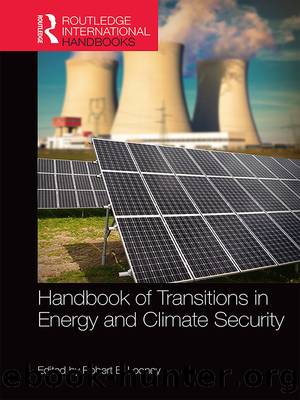Handbook of Transitions to Energy and Climate Security by Robert E. Looney

Author:Robert E. Looney [Looney, Robert E.]
Language: eng
Format: epub
ISBN: 9781857437454
Google: sDUMswEACAAJ
Goodreads: 29208900
Publisher: Routledge
Published: 2016-12-17T00:00:00+00:00
Figure 16.8 Natural gas and oil carbon dioxide related emissions 1980â2014
Source: Authorsâ elaboration based on EIA, Brazil: International Energy Data and Analysis (Washington, DC: EIA, 2015).
Economic competitiveness
While analyzing the Brazilian energy sector, it is possible to paint the profile of a country that in a relatively short time period has managed its huge and variegated natural resources to become a major player in the global economic scene. Part of the story could be defined as successful, another less so, but it is above-all important to underline how the country and its institutions are facing the challenges of fast development with a peaceful and democratic approach, maximizing social inclusion and minimizing the socio-environmental impacts. Many issues have been identified under the energy security perspective in the previous section. The majority of these issues are carefully analyzed and approached by the competent Brazilian technical institutions with the short and medium term development plans mentioned above: Decadal Energy Development Plan (Plano Decenal de Expansao de Energia), National Energy Plan 2030 (Plano Nacional de Energia 2030).41 The main messages could be summarized as need for huge investments in all the specific components of the energy system aiming at achieving: increasing production of fossil fuels; increasing refining capacity; increasing electricity generation capacity; diversification of sources; enhancing the distribution infrastructures; deeper integration of the energy system with neighboring countries. Huge investments that could not be possible without the involvement of the private sector: the country and its institutions have been facing the challenges of balancing the internal economic interests with the attractiveness for international capital.
In 2007, the Brazilian government launched the Growth Acceleration Program (Programa de Aceleração do Crescimento). In its second phase (2011â2014), the program allocated about US$250 billion to the energy sector. The rationale of this investment program is clearly to boost the sector and attract private capital. Foreign investors in the energy sector face a complex mix of structural, bureaucratic and economic difficulties, often referred to as Brazil Cost (Custo Brasil), which make investments in the country less attractive.42 This problem has many consequences: the slow implementation of development plans; the vulnerability of the countryâs economic development to shocks in the energy and energy-related sectors; high final costs of energy hindering investments in other economic sectors. As for the last point, an example comes from electricity consumer prices in the country. Per capita electricity consumption in Brazil remains very low relative to other similar countries, like South Africa or China.43 As of 2012, the price paid for electricity by the Brazilian industrial sector was about $178 per megawatt-hour (MWh), while the domestic consumption was priced about $237/MWh. Industrial energy prices were higher than average prices in Europe and almost four times the prices in the United States. This significantly constrained the development of most of the energy intensive industries (chemicals, iron and steel, glass, ceramics, aluminum, and pulp and paper).44 An example of the energy sectorâs and, in turn, the national economyâs vulnerability to shocks, comes from the close connections that the national
Download
This site does not store any files on its server. We only index and link to content provided by other sites. Please contact the content providers to delete copyright contents if any and email us, we'll remove relevant links or contents immediately.
| Automotive | Engineering |
| Transportation |
Machine Learning at Scale with H2O by Gregory Keys | David Whiting(4292)
Never by Ken Follett(3937)
Urban Outlaw by Magnus Walker(3392)
OPNsense Beginner to Professional by Julio Cesar Bueno de Camargo(3282)
Sapiens and Homo Deus by Yuval Noah Harari(3062)
Will by Will Smith(2906)
A Short History of Nearly Everything by Bryson Bill(2687)
Hooked: A Dark, Contemporary Romance (Never After Series) by Emily McIntire(2545)
Rationality by Steven Pinker(2351)
Borders by unknow(2301)
The Becoming by Nora Roberts(2188)
Holy Bible (NIV) by Zondervan(2123)
A Short History of War by Jeremy Black(1842)
HBR's 10 Must Reads 2022 by Harvard Business Review(1839)
The One Percenter Encyclopedia by Bill Hayes(1824)
Freedom by Sonny Barger(1793)
Go Tell the Bees That I Am Gone by Diana Gabaldon(1748)
Five Ways to Fall by K.A. Tucker(1737)
Girls Auto Clinic Glove Box Guide by Patrice Banks(1724)
